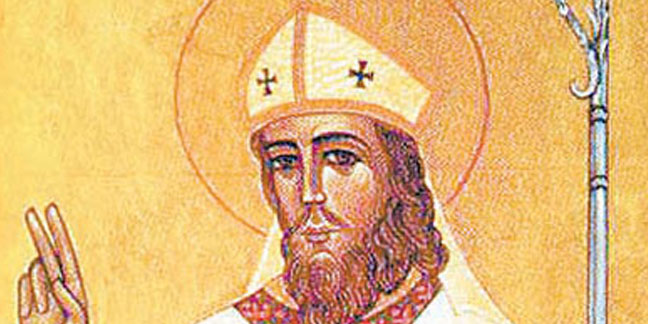"They didn't know who they were." This is how Hilary summed up the problem with the Arian heretics of the fourth century.
Hilary, on the other hand, knew who he was – a child of a loving God who had inherited eternal life through belief in the Son of God. He hadn't been raised as a Christian, but he had felt a wonder at the gift of life. Yet, his search for the meaning of life wasn't easy.
In the words of Olivier Clément, "For a long time he was a searcher after God. He moved from hedonism, to stoicism, he tried out sects and esoteric cults... ."
In his heart, Hilary knew he wasn't a beast grazing in a pasture. Human beings should rise above desires and live lives of virtue, philosophers wrote. But Hilary knew deep down that humans were meant for even more than living a good life.
So he kept looking. He was told many things about the divine, many that we still hear today: that there were many gods, that God didn't exist and that all creation was the result of random acts of nature, that God existed but didn't really care for His creation, that God was in creatures or images. His soul told him these ideas were wrong. God had to be one because no creation could be as great as God. God had to be concerned with God's creation – otherwise, why create it?
At that point, Hilary later wrote, he "chanced upon" the Hebrew and Christian Scriptures. When he read the verse where God tells Moses "I AM WHO I AM" (Exodus 3:14), Hilary said, "I was frankly amazed at such a clear definition of God, which expressed the incomprehensible knowledge of the divine nature in words most suited to human intelligence."
But still he was troubled. Now he knew the giver of life, but what was he, the recipient of the gift? Was he just created for the moment to disappear at death? It made sense that God's purpose in creation should be "that what did not exist began to exist, not that what had begun to exist would cease to exist." Then Hilary found the Gospel of John, where he read about the Son of God and how Jesus had been sent to bring eternal life to those who believed.
Finally, Hilary's soul was at rest. He wrote, "No longer did it look upon the life of this body as troublesome or wearisome, but believed it to be what the alphabet is to children... namely, as the patient endurance of the present trials of life in order to gain a blissful eternity."
He was baptized in about 345, and about 350 the clergy and laity of his hometown, Poitiers, France, elected him bishop because of his intellect and zeal. And it wasn't long before his newfound faith got him into trouble.
The Arians, who did not believe in Christ's divinity, were growing in power and persecuting many faithful. When Hilary refused to support the Arians' condemnation of St. Athanasius, he was exiled from Poitiers to Phrygia (in modern-day Turkey) in 356. The Arians couldn't have had a worse plan – for themselves.
Hilary had known little of the whole Arian controversy before being banished. But being exiled from his home and his duties gave him plenty of time to study and write. He learned everything he could about the Arians, and then he began to write: "Although in exile we shall speak through these books, and the word of God, which cannot be bound, shall move about in freedom." Writings of his that still exist include the 12-book series "On the Trinity," "Commentary on St. Matthew's Gospel," and "Treatises on the Psalms."
After three years the emperor kicked him back to Poitiers because he was tired of having to deal with the troublemaker, "a sower of discord and a disturber of the Orient." But no one told Hilary he had to go straight back home, so he took a leisurely route through Greece and Italy, preaching against the Arians as he went.
In the East he had heard the hymns used by Arians as propaganda. So when he was back at home, Hilary started writing hymns of propaganda himself to spread the true faith. These hymns are the first in the West with a known writer.
A favorite motto of his was "Ministros veritatis decet vera proferre" ("Servants of the truth ought to speak the truth").
Hilary died in 367 or 368 and was proclaimed a doctor of the Church in 1851. His feast day is Jan. 13.
— Source: www.Catholic.org



